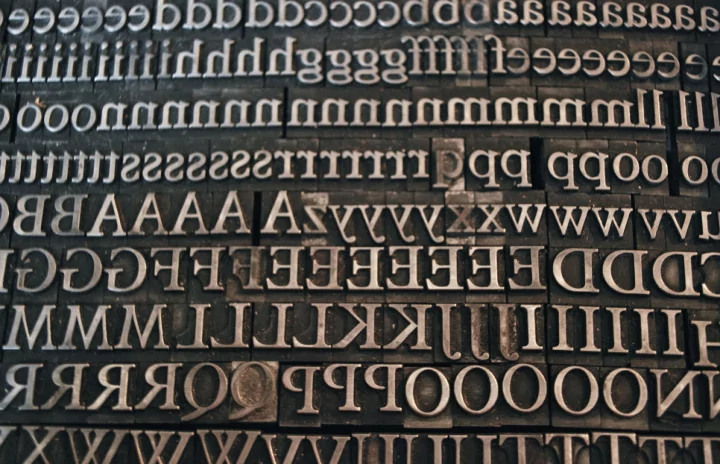

Problems with early language systems: — Complicated
Problems with early language systems: — Complicated — Combinations of Pictographs, Rebus and Ideographs
Problems with early language systems: — Complicated — Combinations of Pictographs, Rebus and Ideographs — Enormous number of symbols
Problems with early language systems: — Complicated — Combinations of Pictographs, Rebus and Ideographs — Enormous number of symbols — Small percentage of population could understand or master the system
A detail from a diagram displaying several evolutionary steps of Western alphabets.
Alphabet: A set of visual symbols or characters used to represent the elementary sounds of a spoken language. They can be connected and combined to signify sounds, syllables and words.
The Phaistos Disk, undated. The 241 signs include a man in a plumed headdress, a hatchet, an eagle, a carpenter’s square, an animal skin and a vase.
Aramaic alphabet evolved into Hebrew and Arabic alphabets
The graphic forms of the Hebrew alphabet are squared, bold letters whose horizontal strokes are thicker than their vertical strokes.
The two principle forms of written Arabic are Kufic and Naskhi
Kufic characters are bold, elongated and angular.
(close-up) Arabic characters
Q’uran manuscript, written in the cursive Naskhi style of Arabic calligraphy
Indian Sanskrit
The Greek Alphabet The Greeks applied geometric structure to the uneven Phonecian characters, converting them into beautifully balanced forms.
DO THIS! Follow GO me THERE! now! NOT THERE!
Papyrus manuscript, fourth century, BCE This example of the Greek alphabet shows the symmetrical form and even visual rhythm.
An example of the quality of carved Greek inscription, c. fifth century BCE
Boustrephedon (meaning “to plow the field with an ox”) The Phonecian (and early Greek) method of reading and writing every other line back and forth — right to left, then left to right.
As early as the Second Century CE, the Greeks developed a more rounded writing style called Uncials
Greek wooden tablet with uncials, CE 326. The rounded uncials allowed an A to be made with two strokes instead of three, and an E to be made with three strokes instead of four.
Greek juror’s ballots, fourth century, BCE. A juror voted “not guilty” with a ballot having a solid hub. A hollow-hubbed ballot was used to cast a “guilty” vote. Greek signature seals, fifth century BCE
Latin (Roman) Alphabet
Greco-Roman Innovations The two most important contributions to graphic design history were the complete, easy to use alphabet and the codex form of the book
The Greek letters Y and Z were eventually added as the Romans began to appropriate Greek words into their own culture. 3 additional letters ( J, U and W) were added during the Middle Ages to arrive at our current number of 26.
Carved inscription from the base of Trajan’s column, c. CE 114. Located in Trajan’s forum in Rome, this is an excellent example of Capitalis Monumentalis
A detail from an inscription on a tomb along the Appian Way, Rome
Capitalis Quadrata (square capitals)
Capitalis Rustica (rustic capitals)
VELLUM, the finest parchment is made from the smooth skins of newborn calves
http://www.youtube.com/watch?v=2-SpLPFaRd0
The CODEX was the first book format. Sheets of parchment were gathered, folded and stitched like the pages of a book
Christians used the CODEX format as a way of distinguishing themselves from the pagans and their scrolls
Hangul
https://vimeo.com/1535016
Recommend
More recommend